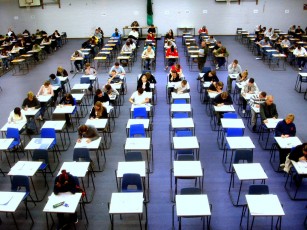Exams and coursework cheating epidemic, what can be done about it?

It’s an inherent attribute we brought with us, the knowledge and awareness that cheating of any form is bad.
The littlest of kids know it instinctively. Why then do we grow up suppressing this praiseworthy emotion, especially when it comes to exams – life’s first hurdle? Amazingly, students have outdone themselves in finding ways and means to cheat at exams, from well-known mundane tricks to technological feats. It invariably happens when less time is given for studying, when most often priorities get shifted to the more enjoyable things in life! So you’ve been young once, maybe you still are – and you know the feeling!!! Life is not all about diligently toiling for the grade although a grade is a pre-requisite for the future career. Taking a broad view of cheating at exams with full empathy for students, the drawbacks for both student and the university cannot in any way justify the short-term benefits of cramming and cheating.
It’s interesting to note in an objective manner how students cheat at exams. A lot of planning goes into the process from deciding on the method, gathering the materials and executing the operation smoothly under the surveillance of vigilant invigilators. An element of acting is necessary in order to project an air of normalcy during the process. Evidence once used should be destroyed, e.g. crib notes. That involves further strategies. The student needs to be thorough in executing the plan, which includes mental rehearsals and possibly disturbed nights. The methods are many, some well known, some unique, for example, the rubber band method where tiny but decipherable notes are made on a stretched rubber band. A simple pen could contain a roll of notes visible under its clear plastic exterior, and is hardly noticeable to others unless one takes a close look at it. Students commonly use camera phones, calculators, and the latest communication devices to retrieve information innocuously and transmit it to others. In technologically advanced countries, the situation is worse where off-site sources transmit information to the classroom in a highly sophisticated, undetectable manner.
While psychologists grapple with the issue of whether this an emotional or moral dilemma, university authorities are valiantly fighting a battle to curb the massive level of cheating that is taking place under their noses without looking at themselves first.
How is their curriculum? Is it one that leaves no room for the student but to cheat in order to pass? We know that sometimes, the semester workload could be too weighty, unrealistic, leaving little or no time for normal human activity. Has it not happened that learning material and literature was rushed through with inadequate explanation time and that the workload has been unreasonably heavy, leaving little personal time for the student. Has it not happened that many a test is scheduled into one block period leading to rush and stress. Gradings could be harsh, tests could be designed to be rigorous – after all, they are here to learn, this is a University, not a playground…right!!
A few ground rules, clearly articulated and a few basic precautions a University could take to ensure academic integrity would be to:
- A clearly visible “No talking please during the examination” sign;
- Technical devices cannot be brought to class for obvious reasons apart from disturbances, and this could include ear devices. A separate area could be allocated for storing personal effects during this time;
- No leaving the classroom during exams except in extreme circumstances, if so, the student cannot return;
- Alertness on the part of invigilators, at least two to an examination acts as an unspoken deterrent. Invigilators should be trained to note unusual behavior that would also include excessive fidgeting, tapping or other forms of attracting attention;
- Relocating seats so that students cannot predict their seating location, while also keeping adequate space between desks to avoid the obvious;
- CCTV camera footage that would allow the university to zoom into suspicious activity even after the course.
Apart from trying to outwit students at their game, Universities could look inward by having a survey on students’ opinions of the curriculum. This would cover its practicality in terms of course duration, course content, learning resources, teaching staff, library facilities, back up tutoring for those, e.g. international students, requiring assistance, student counseling, and financial assistance.
Some of the more successful Universities have found that incorporating an element of relaxation into classes, such as light, in-topic presentations and creating networking situations within the University bring about a healthier atmosphere. Students with a hectic social live and many extra-curricular activities outside the University are the ones most likely to cheat. So why not also build regular motivational sessions that remind of their presence at the University and ground motive in following the course, whether they should change themselves or their environment. This would bring students back to reality. Humans beings, sadly, need constant reminding and motivating!
Created : January 19th, 2016




